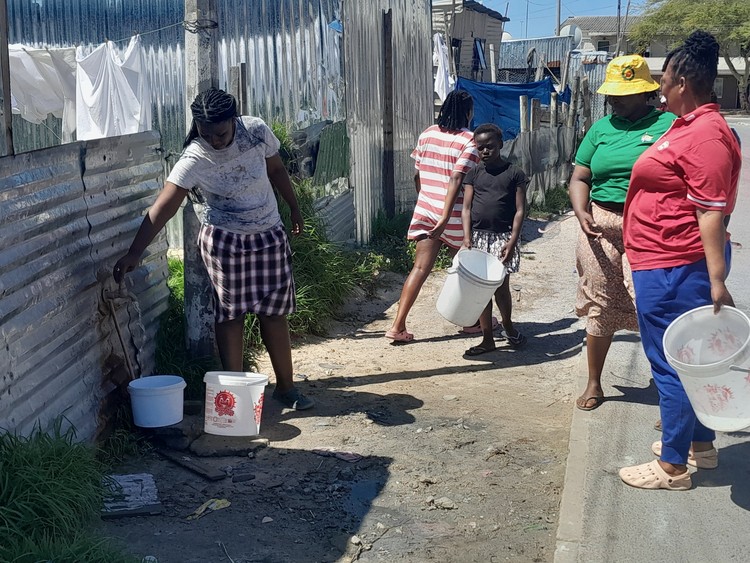800 families share two “illegal” taps
Mfuleni residents have also had to resort to digging holes to bury human waste
Nearly 800 families in Malgus Camp informal settlement in Mfuleni depend on two taps they have connected to the municipal supply. Photo: Vincent Lali
Nearly 800 families in Malgus Camp informal settlement in Mfuleni, Cape Town, rely for water on two taps they have installed and connected to the municipal supply themselves.
Malgus was established in 2020 during Covid lockdown by former backyarders. More people arrived in 2022 when their landlords received RDP houses in Esibaneni. The informal settlement has no toilets and people have resorted to burying human waste.
Community activist Belinda Sikhephe said residents pooled money to buy two taps and hire plumbers to connect them to municipal supply. They maintain and sometimes have to replace the taps themselves.
But two taps are inadequate for 800 households and people queue for water for up to 30 minutes to fill a bucket. When taps run dry, residents fetch water from Shukushukuma, an informal settlement nearby that has water access. They must cross Mfuleni main road, a busy road used by taxis, while struggling with buckets full of water.
As there are no communal toilets, residents go to the nearby hostel, shopping mall or taxi rank. Residents have also resorted to digging holes to bury their waste or relieve themselves in buckets. These holes pose a risk.
“Residents unfamiliar with our area sink into the holes while walking at night,” said community activist Limise Ndulula. “Recently, a young girl fell into a hole and came out drenched.”
Ndulula spent R2,500 installing a private tap in her shack so her children wouldn’t be late for school because of queuing for water.
“You can’t do anything without water,” she said. “We want the government to install taps and toilets here.”
There is also no routine waste collection. People dump garbage in Shukushukuma. Community leader Walala Sam said uncollected rubbish clogs storm water drains, causing flooding.
Cape Town mayco member for water and waste Councillor Zahid Badroodien said that connecting to city infrastructure without permission is illegal and can pose health risks. He said the City will investigate the feasibility of providing services to the area.
However, the City’s media department said that it is unable to cater for these unplanned settlements as existing informal settlements are prioritised on the basis of available resources.
The City has promised to distribute refuse bags on Thursday, though previous distribution attempts were hampered when officials were robbed.
Support independent journalism
Donate using Payfast

Next: Unemployed Tembisa men step in to clean filthy chemical toilets
Previous: Targeting immigrant spaza shops is unconstitutional, warns activist
© 2024 GroundUp. This article is licensed under a Creative Commons Attribution-NoDerivatives 4.0 International License.
You may republish this article, so long as you credit the authors and GroundUp, and do not change the text. Please include a link back to the original article.
We put an invisible pixel in the article so that we can count traffic to republishers. All analytics tools are solely on our servers. We do not give our logs to any third party. Logs are deleted after two weeks. We do not use any IP address identifying information except to count regional traffic. We are solely interested in counting hits, not tracking users. If you republish, please do not delete the invisible pixel.

